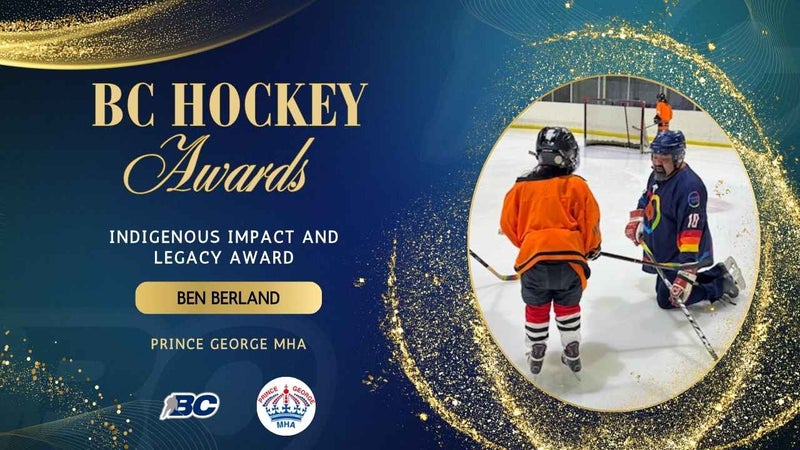BC HOCKEY AWARDS: INDIGENOUS IMPACT AND LEGACY AWARD - BEN BERLAND

By MARIO ANNICCHIARICO
BC Hockey’s Indigenous Impact and Legacy Award is annually presented to an individual, team, league or association that has demonstrated a commitment to increase Indigenous inclusivity and participation in the sport of hockey.
It, essentially, describes the 2024-25 winner, Ben Berland, to a tee.
“I was one of the people that sits on the committee that usually selects the award winner,” said Berland, a key member of the BC Hockey Indigenous Participation Work Group. The committee works toward the overall goal to ensure that provincial hockey programs are focused on increasing participation of Indigenous people in hockey and ensures that programs provide safe and welcoming environments for Indigenous people.
“We were the ones who created the award based on our goals of bringing reconciliation to hockey. So, for it to come around and be awarded to me is something that I can’t really express on how it makes me feel. I’m overwhelmed that somebody nominated me and then to be named the award winner. I think of all the Indigenous people involved in hockey and how that number has grown over the years. There are some truly remarkable people out there and I’m overwhelmed that I was chosen for it.”
Involved in hockey for more than 40 years, Berland continues to share his love for the sport, especially with his Indigenous people.
“Over the years I think of the work I’ve done in hockey and the goal of getting more Indigenous kids into the game is always sitting at the back of my mind,” he admitted. “Yes, I’m a coach and yes, I did instruct for BC Hockey and did a lot of other things, but still in the back of my mind is the thought of getting more Indigenous kids into the game.”
And the numbers have grown.
“Just a few weeks ago, we were down in Kamloops for a meeting and we got to watch the finals of the National Aboriginal Hockey Championship. A long time ago, in 2004, Prince George hosted that championship and the level of hockey from that tournament to now is like night and day,” said Berland.
“Back then, you might have had one line per team, if you were lucky, that were playing AAA or a high level of hockey. Now, every single kid out there is playing an elite level of hockey and just to watch it, it’s like, ‘This is wonderful,’ ” Berland said proudly.
“I was fortunate enough that my daughter (Finlay) got to see that. She’s a hockey player now and she was amazed. I said, ‘This could be you one day, if you work hard at it.’ ”
Berland, himself, has worked feverishly at providing those opportunities, having coached since 1992 and having played for 47 years. He’s previously taught the Speak Out program which is now known as Respect in Sport. That gave him an opportunity to present his perspective on growing up being a minority.
“I presented it in a way where it wasn’t self-serving and presented in a way that was more reconciliatory in nature. Trying to get people to understand that what they hear and see is not often what the truth is when it comes to assumptions about people,” he said. “I miss doing that.”
Berland also advocates for more girl’s hockey through a first steps program designed purely for beginners and with Indigenous girls in mind.
Dubbed the “Whezdut’us Program”, which translates to “We take our first step” in the Binche Whut’en vocabulary, the program provides an opportunity to learn about hockey.
“All we ask is that kids have skates and helmets and then we provide a stick, jersey and swag bag. It’s been great. The kids have a great time,” said Berland, who loves to give of his time and efforts and has been a steadfast volunteer with BC Hockey since the early 2000s, contributing primarily through coaching and clinic instruction.
With experience ranging from grassroots initiatives to BC Hockey’s prestigious Program of Excellence, Berland has demonstrated a long-standing commitment to developing players at all levels. The bottom line is Berland continues to champion accessibility and belonging in the sport he loves.
“I never ask for anything back, just that people say thank you,” he said.